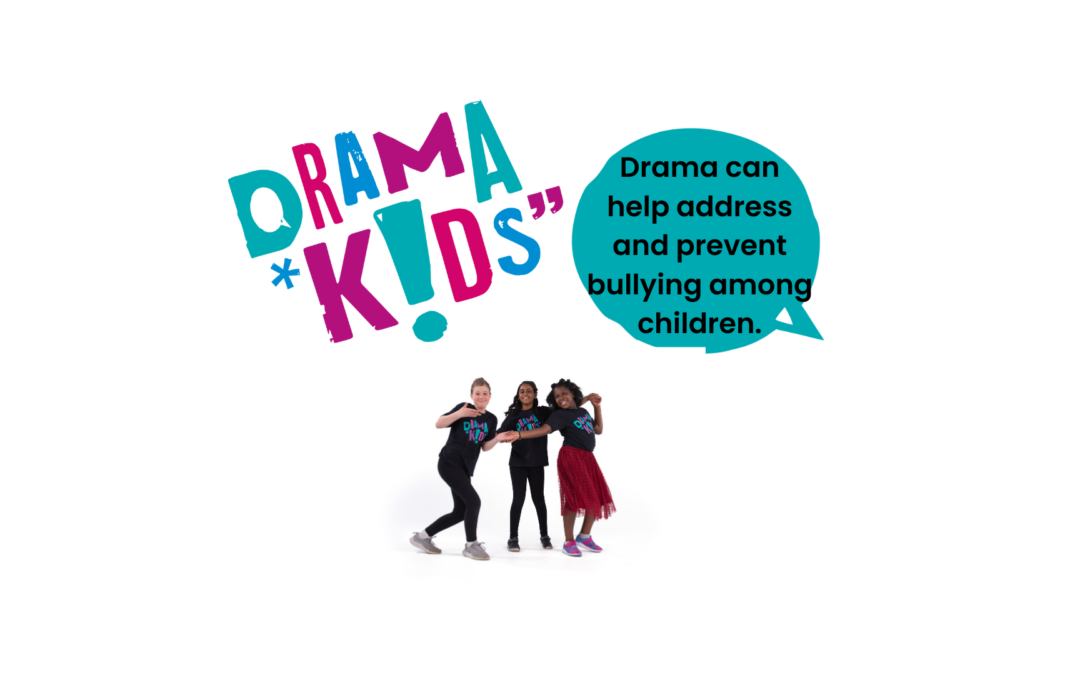The benefits of attending a weekly lesson with Drama Kids builds empathy and so much more… creating strong individuals. Drama Kids also offers in-school workshops – The Schools Programme is intended to work within an education setting focusing on literacy and communication projects and is designed to use drama and the arts as a tool to empower children and adults verbally.
Drama can be a powerful tool in addressing and preventing bullying among children in several ways:
- Empathy Building: Drama Kids activities often involve role-playing and character exploration, which can help children develop empathy by allowing them to see situations from different perspectives. By understanding how it feels to be in someone else’s shoes, children are more likely to empathize with others and refrain from engaging in bullying behavior.
- Conflict Resolution: Drama Kids provides a platform for children to explore and practice conflict resolution skills in a safe and supportive environment. Through improvisation and role-playing exercises, children learn how to communicate effectively, negotiate conflicts, and resolve disagreements peacefully, which can help prevent bullying and promote positive peer relationships.
- Building Self-Esteem: Participating in drama a weekly Drama Kids lesson can boost children’s self-esteem and confidence, making them less susceptible to bullying behavior. By providing opportunities for children to express themselves creatively, receive positive feedback, and develop their talents, drama helps build a sense of self-worth and resilience that can protect against the negative effects of bullying.
- Promoting Inclusion and Acceptance: Drama Kids encourages collaboration and teamwork, fostering a sense of belonging and acceptance among children. Through group activities and performances, children learn to appreciate diversity, respect differences, and celebrate each other’s unique strengths and talents, creating a more inclusive and supportive community where bullying is less likely to occur.
- Developing Social Skills: Drama Kids promotes the development of essential social skills such as communication, cooperation, and leadership, which can help children build positive relationships and navigate social situations effectively. By providing opportunities for children to interact with their peers in a creative and collaborative setting, drama helps foster a sense of camaraderie and mutual respect that can deter bullying behavior.
- Encouraging Assertiveness: Drama Kids empowers children to assert themselves and stand up for themselves and others in the face of bullying. Through role-playing and improvisation exercises, children learn how to assert their boundaries, express their feelings assertively, and seek help from trusted adults or peers when faced with bullying behavior.
- Creating a Culture of Respect: Drama Kids programs often emphasize the importance of respect, both for oneself and others. By promoting a culture of respect and kindness within the group, drama helps create a positive and supportive environment where bullying is not tolerated and where children feel safe and valued.
Overall, drama can play a vital role in promoting positive social interactions, fostering empathy and inclusion, and equipping children with the skills and confidence to stand up against bullying behavior. By integrating drama into school curricula and extracurricular activities, educators can help create a more empathetic, respectful, and bully-free environment for children to thrive. Inquire today about Drama Kids in-school workshops the difference is dramatic!
